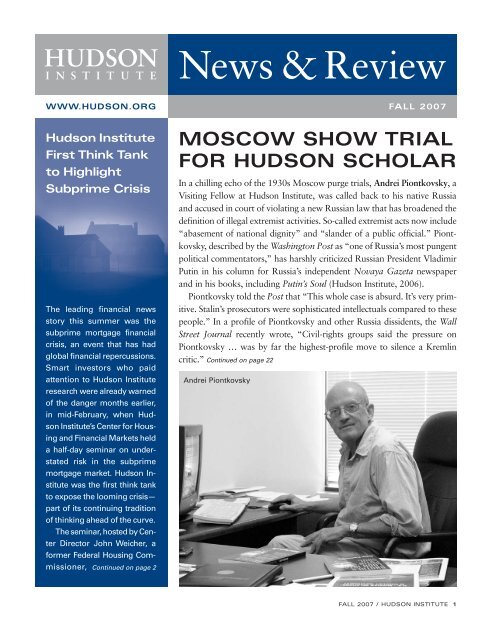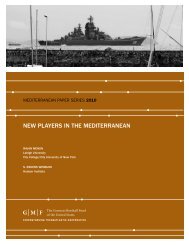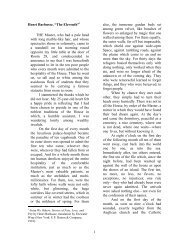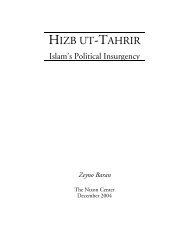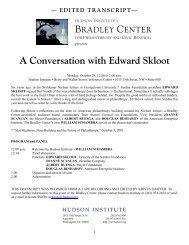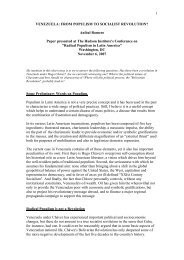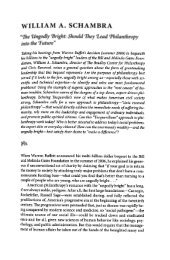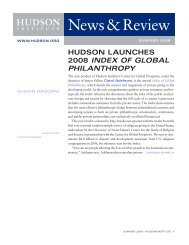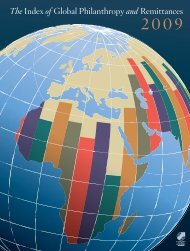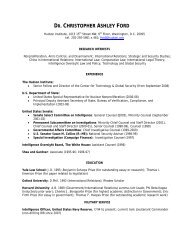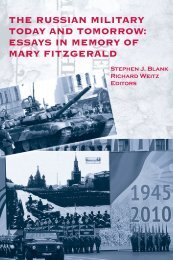Create successful ePaper yourself
Turn your PDF publications into a flip-book with our unique Google optimized e-Paper software.
HUDSON<br />
I N S T I T U T E<br />
News & Review<br />
WWW.HUDSON.ORG<br />
FALL 2007<br />
<strong>Hudson</strong> <strong>Institute</strong><br />
First Think Tank<br />
to Highlight<br />
Subprime Crisis<br />
The leading financial news<br />
story this summer was the<br />
sub prime mortgage financial<br />
crisis, an event that has had<br />
global financial repercussions.<br />
Smart investors who paid<br />
attention to <strong>Hudson</strong> <strong>Institute</strong><br />
re search were already warned<br />
of the danger months earlier,<br />
in mid-Feb ruary, when <strong>Hudson</strong><br />
In st itute’s Center for Housing<br />
and Financial Markets held<br />
a half-day seminar on understated<br />
risk in the subprime<br />
mortgage market. <strong>Hudson</strong> In -<br />
s titute was the first think tank<br />
to expose the looming crisis—<br />
part of its continuing tradition<br />
of thinking ahead of the curve.<br />
The seminar, hosted by Center<br />
Director John Weicher, a<br />
for mer Fed eral Housing Com -<br />
missioner, Continued on page 2<br />
MOSCOW SHOW TRIAL<br />
FOR HUDSON SCHOLAR<br />
In a chilling echo of the 1930s Moscow purge trials, Andrei Piont kovsky, a<br />
Visiting Fellow at <strong>Hudson</strong> <strong>Institute</strong>, was called back to his native Russia<br />
and accused in court of violating a new Russian law that has broadened the<br />
definition of illegal extremist activities. So-called extremist acts now include<br />
“abasement of national dignity” and “slander of a public official.” Piont -<br />
kovsky, described by the Washington Post as “one of Russia’s most pungent<br />
political commentators,” has harshly criticized Russian President Vladimir<br />
Putin in his column for Russia’s independent Novaya Gazeta newspaper<br />
and in his books, including Putin’s Soul (<strong>Hudson</strong> <strong>Institute</strong>, 2006).<br />
Piontkovsky told the Post that “This whole case is absurd. It’s very primitive.<br />
Stalin’s prosecutors were sophisticated intellectuals compared to these<br />
people.” In a profile of Piontkovsky and other Russia dissidents, the Wall<br />
Street Jour nal recently wrote, “Civil-rights groups said the pressure on<br />
Piontkovsky … was by far the highest-profile move to silence a Kremlin<br />
critic.” Continued on page 22<br />
Andrei Piontkovsky<br />
FALL 2007 / HUDSON INSTITUTE 1
<strong>Hudson</strong> <strong>Institute</strong><br />
First Think Tank<br />
to Highlight<br />
Subprime Crisis<br />
CHAIRMAN’S<br />
LETTER<br />
Continued from page 1<br />
featured a paper (avail able on<br />
Hud son’s website) by Joseph<br />
Mas on of Drexel University and<br />
Joshua Rosner of Graham Fisher<br />
and Co. The paper presciently<br />
argued that risky mort gages and<br />
collateralized debt obligations<br />
(CDOs) could experience significant<br />
losses due to stagnation in<br />
the housing market. It raised<br />
con cerns that inadequate transparency<br />
in the rapidly-growing<br />
private label market—and a credit<br />
rating in dustry ill-equipped to<br />
recognize the risks of CDOs—<br />
might trigger a broader financial<br />
crisis. “The subprime market is<br />
new, and it has grown very fast. It<br />
barely ex isted 20 years ago but<br />
ac counted for 20% of mortgage<br />
originations last year. And as it<br />
grew, it changed,” Weicher wrote<br />
in a recent op-ed in the Wall<br />
Street Journal.<br />
The New York Times covered<br />
the Rosner and Mason paper on<br />
the front page of its business<br />
section in February. The paper<br />
has also been widely cited in<br />
dozens of publications, including<br />
the Washington Post, Wall<br />
Street Journal, and the Financial<br />
Times. The specific concerns<br />
about the credit rating industry<br />
have subsequently attracted<br />
attention on Capitol Hill.<br />
Dear Friend of <strong>Hudson</strong> <strong>Institute</strong>:<br />
I am pleased to report that the last few months have been very<br />
productive at <strong>Hudson</strong> <strong>Institute</strong>.<br />
Policymakers from Honduras to Lithuania to Japan have called<br />
on <strong>Hudson</strong> <strong>Institute</strong> scholars for timely briefings on today’s global<br />
challenges.<br />
We have released major new studies on defense cooperation, radical<br />
Islam, and U.S.-Russian and U.S.-Turkish relations, as well as the<br />
second annual edition of our highly acclaimed Index of Global<br />
Philanthropy, which received media coverage in a variety of news<br />
outlets, including the Wall Street Journal and C-SPAN.<br />
And months before anyone else, <strong>Hudson</strong> research warned of a<br />
possible crisis in the subprime mortgage market.<br />
Our press visibility has never been higher, with opinion articles in<br />
such prestigious venues as the Washington Post and the Wall Street<br />
Journal. <strong>Hudson</strong> conferences in New York and Washington have been<br />
covered by major media outlets around the world.<br />
As you begin to consider your end-of-year giving, I ask that you<br />
give serious consideration to contributing to <strong>Hudson</strong> <strong>Institute</strong> to<br />
provide support for the important research we undertake. You can<br />
use the enclosed envelope to send us your tax-deductible donation.<br />
Your support will allow us to expand the outreach of our unique,<br />
future-oriented approach to the critical policy issues of the day.<br />
With best wishes,<br />
Allan R. Tessler<br />
Chairman of <strong>Hudson</strong> <strong>Institute</strong> Board of Trustees<br />
2 HUDSON INSTITUTE / FALL 2007
HUDSON<br />
MEDIA<br />
HIGHLIGHTS<br />
■ FOX NEWS<br />
Richard Miniter on al Qaeda<br />
September 7<br />
■ NTV (Russia)<br />
Amy Kauffman interviewed on<br />
Fred Thompson’s campaign<br />
September 4<br />
■ CBS News<br />
Jonathan Paris on U.S.-Saudi<br />
Arabian relations<br />
August 1<br />
■ NewsHour with Jim Lehrer<br />
Zeyno Baran interviewed about<br />
Turkish elections<br />
July 23<br />
■ CBC TV (Canada)<br />
Kenneth Weinstein on President<br />
Bush’s Iraq speech - August 20<br />
■ CNN<br />
John Fonte discusses immigration<br />
August 20<br />
■ CNN<br />
Christopher Sands featured on the<br />
Montebello summit<br />
August 20<br />
■ Today Show<br />
Ronald Dworkin interviewed about<br />
antidepressants<br />
July 30<br />
■ Washington Post Radio<br />
Irwin Stelzer interviewed on<br />
Prime Minister Gordon Brown’s<br />
visit to the U.S.<br />
July 30<br />
■ CNBC<br />
Betsy McCaughey on<br />
healthcare costs<br />
July 24<br />
■ Al Jazeera<br />
Herbert London on the Middle East<br />
July 23<br />
■ CNN<br />
Dennis Avery interviewed on<br />
global warming<br />
July 21<br />
■ BBC TV<br />
Richard Weitz on Russia’s military<br />
August 17<br />
■ EWTN TV<br />
Nina Shea on Christians in Iraq<br />
August 3<br />
■ Fox News Channel<br />
Anne Bayefsky cited on the<br />
United Nations<br />
July 21<br />
FALL 2007 / HUDSON INSTITUTE 3
SCHOLAR IN THE SPOTLIGHT<br />
WILLIAM SCHAMBRA<br />
<strong>Hudson</strong> Media Highlights continued<br />
■ Radio Marti<br />
Paul Marshall discusses global<br />
religious freedom<br />
July 11<br />
■ NPR<br />
Husain Haqqani on Pakistan<br />
July 10<br />
■ CTV (Canada)<br />
Andrei Piontkovsky on Russian<br />
President Vladimir Putin’s visit<br />
to the U.S.<br />
July 2<br />
■ NPR<br />
Meyrav Wurmser debates<br />
engagement with Hamas<br />
June 28<br />
“What is really very nice about <strong>Hudson</strong> <strong>Institute</strong> is that it is trying to<br />
stir debate and discussion in a sector—the nonprofit sector—which<br />
is intellectually moribund,” Georgetown University Scholar Pablo<br />
Eisenberg said at a public gathering August 9. At the center of this<br />
effort is <strong>Hudson</strong> Senior Fellow William Schambra, Director of the<br />
Bradley Center for Philanthropy and Civic Renewal. Since the center<br />
was founded at <strong>Hudson</strong> <strong>Institute</strong> in January 2003, Schambra has<br />
hosted dozens of discussions on hot button issues in the sector such<br />
as the political activity of 501(c)(3)s, Warren Buffett’s bequest to the<br />
Gates Foundation, the sector’s costly obsession with measurement<br />
and evaluation techniques, and philanthropy’s involvement in campaign<br />
finance reform. He is frequently invited to speak to nonprofit<br />
gatherings and university groups around the country and to write<br />
for the sector’s most widely distributed publication, the Chronicle of<br />
Philanthropy. These activities are often the fodder for discussion in<br />
several blogs on the nonprofit sector and philanthropy.<br />
Schambra’s “citizen-centered, town-square view of politics—and<br />
policymaking,” as described in a December 2006 profile in WORLD<br />
Magazine, informs his work, “helping to advance a view of effective<br />
philanthropy as being rooted in local communities.” Prior to joining<br />
<strong>Hudson</strong> <strong>Institute</strong>, he worked for eleven continued on page 22<br />
■ MSNBC<br />
Diana Furchtgott-Roth on<br />
the immigration bill<br />
June 24<br />
■ FOX NEWS<br />
Leon de Winter on Islam<br />
in Europe<br />
June 15<br />
■ BBC<br />
William Odom discusses the<br />
Iraq war<br />
June 15<br />
■ Fox News Channel<br />
David Satter on Vladimir Putin<br />
at the G-8 summit<br />
June 9<br />
■ Voice of America<br />
William Odom on the<br />
Iraq War<br />
June 6<br />
4 HUDSON INSTITUTE / FALL 2007
EXCERPTS OF<br />
CONGRESSIONAL TESTIMONY<br />
BY HUDSON SCHOLARS<br />
ZEYNO BARAN’S<br />
testimony on energy and<br />
democracy in Central and<br />
Eastern Europe before the<br />
House Foreign Affairs<br />
Committee<br />
July 25<br />
As the EU and the U.S. are act ive ly<br />
working to diversify European gas away<br />
from Russia (by supporting a pipe line<br />
project called Nabucco to trans port gas<br />
from the Caspian region via Turkey,<br />
Bulgaria, Romania, and Hun gary, ending<br />
in Austria), Moscow has used its<br />
economic relations with Hungary (trade<br />
between Hungary and Russia increased<br />
by 70 percent over the last year) to try<br />
to pull Budapest away from its EU and<br />
NATO allies. As in Uk raine, energy<br />
played a key role in this effort.<br />
In 2000, an Irish-registered company<br />
called Milford Holding acquired a<br />
significant stake in BorsodChem,<br />
Hun gary’s primary chemical company<br />
and owner of a pipeline distribution<br />
network. It was soon revealed that<br />
Gaz prom was the real force behind<br />
Mil ford Holding. Shortly thereafter, a<br />
series of obscure, recently created com -<br />
panies began snatching up BorsodChem<br />
shares. Fearful that Gazprom or other<br />
Russian actors might be behind these<br />
firms as well, the Hungarian government<br />
rallied local companies and banks<br />
to fight off further intrusion and prevent<br />
a Russian takeover.<br />
JAIME DAREMBLUM’S<br />
testimony on U.S.-South<br />
American relations before<br />
the House Committee on<br />
Foreign Affairs<br />
June 19<br />
Data from the Economic Commission<br />
for Latin America and the Caribbean<br />
(ECLAC), show that between 2003<br />
and 2006, over 18 million Latin<br />
Americans were able to escape from<br />
the poorest ranks of society. This is a<br />
tangible testimony to falling unemployment,<br />
improved income distribution,<br />
and a strong upswing in the<br />
number of jobs, namely in some South<br />
American countries, among them<br />
Colombia and Peru.<br />
Growing trade opportunities lie at<br />
the core of such economic and social<br />
advances. And trade, precisely, has<br />
been a chapter in which the U.S. has<br />
kept constantly engaged since 1983<br />
through various free trade programs<br />
such as the Caribbean Basin Initiative<br />
(CBI), culminating in actual free trade<br />
agreements, namely with Chile, D-<br />
Cafta, plus those with Colombia, Peru,<br />
and Panama. It is crucial that the latter<br />
three agreements, as it was with Chile<br />
and D-Cafta, receive congressional<br />
approval for the benefit of millions<br />
more Latin Americans and of course<br />
American producers and consumers.<br />
This is a promise the U.S. cannot<br />
afford to abandon or circumvent, particularly<br />
in Colombia, without incurring<br />
costly negative consequences. As<br />
we all know, until only a few years<br />
ago, a democratic Colombia was on<br />
the verge of being lost amidst the<br />
chaos and extreme violence generated<br />
by drugs and drug-related terrorism.<br />
Thanks to the resilience of the<br />
Colombian people and the sustained<br />
backing of the U.S. through Plan<br />
Colombia, as well as the able leadership<br />
of President Álvaro Uribe, the<br />
country has begun to turn the tide in<br />
this decades-long battle.<br />
DIANA FURCHTGOTT-<br />
ROTH’S testimony on<br />
worker competitiveness<br />
before the House Ways<br />
and Means Committee<br />
June 14<br />
In 2007, the United States leads the<br />
industrialized world in job creation,<br />
and our unemployment rate is among<br />
the lowest in the industrialized world.<br />
In contrast, unemployment rates in<br />
most other countries are far higher. In<br />
April 2007, the latest month for which<br />
comparable data are available, Ameri -<br />
cans had an unemployment rate of 4.5<br />
percent, while unemployment rates in<br />
the Eurozone were 7.1 per cent; in<br />
France, 8.6 percent; in Germany, 6.7<br />
percent; in Spain, 8.2 percent; and in<br />
Canada, 6.1 percent. Only Japan had a<br />
FALL 2007 / HUDSON INSTITUTE 5
lower rate than the United States, and<br />
its economy is characterized by a<br />
slower rate of GDP growth.<br />
In May 2007, the payroll survey<br />
recorded an increase of 157,000 jobs.<br />
Compared to August 2003, nonfarm<br />
payroll employment has increased by<br />
over 8.0 million jobs, 45 months of<br />
consecutive gains, where professional<br />
and business services added 1.9 million,<br />
education and health services<br />
added 1.7 million, leisure and hospitality<br />
added 1.3 million, trade, transportation,<br />
and utilities added 1.2 million,<br />
construction added 910,000, government<br />
added 653,000, and financial<br />
activities added 436,000. The household<br />
survey showed a gain of 157,000<br />
employed workers in May 2007 as<br />
well, and a gain of over 8.4 million<br />
employed workers since August 2003.<br />
DAVID SATTER’S<br />
testimony on Russia<br />
before the House<br />
Foreign Affairs<br />
Committee<br />
May 17<br />
One of the most important questions<br />
in the world today concerns the intentions<br />
of Russia. One can only wonder<br />
what is motivating Russia to create so<br />
many artificial problems in a short<br />
period of time.<br />
If Russia were motivated by logical<br />
concerns, it would be dedicated to balancing<br />
growing Chinese power, guarding<br />
against Islamic terrorism, and preventing<br />
the emergence of nuclear powers<br />
on its borders. Instead, however,<br />
Russia appears fixated on dominating<br />
the countries that emerged from the<br />
former Soviet Union and appears willing<br />
to sacrifice its vital interests for the<br />
empty satisfaction of appearing to give<br />
orders to countries it believes it has a<br />
right to dominate.<br />
The leaders of a country are usually<br />
dedicated to defending that country’s<br />
vital interests. Developments in Russia,<br />
however, show that there is a real<br />
divergence between the interests of the<br />
country and the interests of the small<br />
group of people who run it.<br />
JOHN FONTE’S<br />
testimony on immigrant<br />
assimilation before the<br />
House Judiciary<br />
Committee<br />
May 16<br />
What do we mean by patriotic assimilation?<br />
First of all, patriotic assimilation<br />
does not mean giving up all ethnic<br />
traditions, customs, cuisine, and birth<br />
languages. It has nothing to do with the<br />
food one eats, the religion one practices,<br />
the affection that one feels for the<br />
land of one’s birth, and the second languages<br />
that one speaks. Multiethnicity<br />
and ethnic subcultures have enriched<br />
America and have always been part of<br />
our past since colonial days.<br />
Historically, the immigration saga<br />
has involved some “give and take”<br />
between immigrants and the nativeborn.<br />
That is to say, immigrants have<br />
helped shape America even as this<br />
nation has Americanized them. On the<br />
other hand, this “two way street” is<br />
not a fifty-fifty arrangement. Thus, on<br />
the issue of “who accommodates to<br />
whom,” obviously, most of the accommodating<br />
should come from the newcomers,<br />
not from the hosts.<br />
So what is patriotic assimilation?<br />
Well, one could say that patriotic<br />
assimilation occurs when a newcomer<br />
essentially adopts American civic values,<br />
the American heritage, and the<br />
story of America (what academics call<br />
the “narrative”) as his or her own.<br />
NINA SHEA’S<br />
testimony before the<br />
House of Represent a tives’<br />
Task Force on Religious<br />
Freedom<br />
May 23<br />
The Egyptian government maintains<br />
tight control over all Muslim religious<br />
ins titutions, including mosques and religious<br />
endowments, which are encouraged<br />
to promote an officially sanctioned<br />
interpretation of Islam. All mosques<br />
must be licensed by the government,<br />
and sermons are monitored by the government,<br />
reportedly as a necessary precaution<br />
against religious extremism and<br />
terrorism. Yet human rights organizations<br />
inside the country are seriously<br />
con cerned that Islamic extremism is in<br />
fact advancing in Egypt, making questionable<br />
the prospects for democratic<br />
reform, religious tolerance, and the<br />
rights of women and girls and members<br />
of religious minorities. Despite the state<br />
controls, some believe that the government<br />
is not acting to its fullest ability to<br />
counteract religious militancy, especially<br />
in the areas of public education and the<br />
media, where extremist influence is<br />
grow ing. In addition to surveillance and<br />
harassment by the state security services,<br />
Coptic Orthodox and members of<br />
other religious minorities also face societal<br />
in tolerance and violence by Muslim<br />
ex tremists. Despite draconian efforts on<br />
the part of the Egyptian government to<br />
fight extremism, these same Egyptian<br />
security entities are often lax in or indifferent<br />
to protecting the lives and property<br />
of minority groups from extremist<br />
violence, as well as in prosecuting those<br />
responsible for the violent actions.<br />
6 HUDSON INSTITUTE / FALL 2007
HUDSON’S INFLUENCE IN ACADEMIA<br />
<strong>Hudson</strong> scholars influence the world of<br />
ideas by publishing articles and monographs<br />
and briefing policymakers.<br />
However, a select group of <strong>Hudson</strong> fellows<br />
teach at America’s top universities,<br />
where they are able to help shape the<br />
minds of the next generation of thinkers<br />
while obtaining a broader perspective<br />
on critical issues of the day.<br />
Senior Fellow William Odom, for<br />
instance, teaches American grand strategy<br />
in the political science department<br />
at Yale University. Senior Fellow Amy<br />
Kass teaches the humanities at the University<br />
of Chicago. Both Odom and<br />
Kass have won awards as outstanding<br />
undergraduate teachers.<br />
Husain Haqqani, co-chair of <strong>Hudson</strong>’s<br />
Islam and Democracy Project,<br />
teaches international relations at Boston<br />
University, while Distinguished Fellow<br />
Robert Bork and Senior Fellow Anne<br />
Bayefsky teach law at Ave Maria Law<br />
School and Touro College, respectively.<br />
In addition to these current faculty<br />
members, <strong>Hudson</strong> scholars have taught<br />
at dozens of universities. <strong>Hudson</strong> President<br />
Herbert London, Professor of the<br />
Humanities at New York University,<br />
was for two decades the driving force<br />
behind and Dean of NYU’s Gallatin<br />
School, which he created in 1972.<br />
Other <strong>Hudson</strong>ians who have served<br />
on university faculties include Hillel<br />
Frad kin (Yale, Columbia, and Univer -<br />
sity of Chicago), Paul Marshall<br />
(University of Toronto and the Free<br />
University of Amsterdam), Richard<br />
Weitz (Harvard), Kenneth Weinstein<br />
(Georgetown and Claremont<br />
McKenna), Charles Fairbanks (Yale<br />
and Johns Hopkins-SAIS), John<br />
Weicher (Ohio State University),<br />
Irwin Stelzer (Cornell, Connecticut,<br />
NYU, Oxford, MIT, and Columbia),<br />
Michael Horowitz (Georgetown<br />
Law), Max Singer (Bar Ilan Univer -<br />
sity), Laurent Murawiec (Ecole des<br />
Hautes Etudes en Sciences Sociales),<br />
and Christopher Sands (Carleton<br />
University).<br />
Finally, beyond the classroom, <strong>Hudson</strong><br />
scholars reach college audiences<br />
through our books, research monographs,<br />
and articles. Herman Kahn’s<br />
texts such as The Emerging Japanese<br />
Superstate, Thinking the Unthinkable,<br />
and The Year 2000 have been standard<br />
classroom fare for years. <strong>Hudson</strong> <strong>Institute</strong><br />
publications are used by professors<br />
in syllabi around the world, including<br />
this year at, among other campuses,<br />
Georgetown, Harvard, Indiana,<br />
Michigan, and Yale.<br />
FALL 2007 / HUDSON INSTITUTE 7
HUDSON’S<br />
INTERN<br />
PROGRAM<br />
<strong>Hudson</strong> <strong>Institute</strong> interns provide critical assistance to the <strong>Institute</strong>. This year,<br />
over 150 students from an array of universities in the United States and<br />
abroad —ranging from Harvard, Princeton, Cornell, University of Chicago,<br />
George town, George Washington University, to the Institut d’Etudes Politiques<br />
de Paris—provided research and administrative support to <strong>Hudson</strong> <strong>Institute</strong><br />
scholars and staff.<br />
Through their internships, these students gain valuable experience and in -<br />
sight into public policy. “My internship has given me a much better understanding<br />
of how the world of communications works,” noted Sibylle Getzin,<br />
a German trainee and graduate of Universität Greifswald, who worked with<br />
Grace Terzian, <strong>Hudson</strong>’s Vice President for Communications, and Rachel<br />
DiCarlo Currie, <strong>Hudson</strong>’s Managing Editor.<br />
<strong>Hudson</strong>’s internship program is run by Senior Fellow Richard Weitz,<br />
Hud son’s Director of Program Man age ment. Weitz, who taught social studies<br />
at Harvard, enjoys the interaction with interns. He observes that “Our best<br />
interns here at <strong>Hudson</strong> have been as good as my best students at Harvard.”<br />
Many undergraduates have proceeded to pursue graduate programs related<br />
to their research agenda at <strong>Hudson</strong>.<br />
Like Weitz, other <strong>Hudson</strong> scholars enjoy the opportunity to mentor our<br />
interns. “<strong>Hudson</strong>’s interns will often become policymakers themselves, so it is<br />
critical that we use our experience and knowledge to help them better understand<br />
the changing global environment,” noted <strong>Hudson</strong> Senior Fellow Hillel<br />
Fradkin.<br />
<strong>Hudson</strong> staff members make an effort to assist former interns to obtain<br />
more permanent entry into the policy world. Recent interns have been hired<br />
by the U.S. government, assumed re search positions at various Wash ington<br />
think tanks such as the Brook ings Institution, and worked on Capi tol Hill.<br />
Several are working for various presidential and other political campaigns—<br />
on both the Demo cratic and Republican side of the aisle. One former intern<br />
recently joined the Jap an ese Foreign Service, while another has taken a post<br />
with the French Foreign Ministry.<br />
Summer 2007 interns sporting the <strong>Hudson</strong> ball cap.<br />
8 HUDSON INSTITUTE / FALL 2007
Tony Snow, Miles Prentice, and Herbert London<br />
<strong>Hudson</strong><br />
EVENTS<br />
SEPTEMBER<br />
REFORMING AND REFINING EXPORT<br />
CONTROLS<br />
Transcripts, summaries,<br />
and photographs of<br />
<strong>Hudson</strong> <strong>Institute</strong><br />
events can be found<br />
at www.hudson.org<br />
In a time of globalization of the defense industry, is the U.S.<br />
system of export controls preventing the export of critical<br />
technologies while encouraging the development of the most<br />
ad vanced technologies and their incorporation into U.S.<br />
military hardware and software? In a <strong>Hudson</strong> conference<br />
this past December, a group of academics, journalists, and<br />
government and military officials discussed the tradeoff<br />
between safeguarding new weapons and technol ogies from<br />
falling into potential enemies’ hands while keeping de fense<br />
trade open enough to facilitate industrial collaboration,<br />
enhance operational coordination, reap the benefits of mass<br />
production, and access the best talents and products worldwide.<br />
Their recommendations were compiled in the just-published<br />
report Export Controls and Technology Transfers:<br />
Turning Obstacles into Opportunities. A follow-up event was<br />
held in September to highlight its publication.<br />
<strong>Hudson</strong> <strong>Institute</strong> CEO Kenneth Weinstein introduced<br />
the event. Maria Farkas, former <strong>Hudson</strong> research fellow<br />
and editor of the report, outlined the report’s major findings.<br />
Special guests Lincoln P. Bloomfield Jr. and Jeffrey P. Bialos<br />
commented on the report and the current state of affairs in<br />
the export-control arena.<br />
THE ROLE AND RESPONSIBILITY OF<br />
A DEMOCRATIC INDIA<br />
As the world’s largest democracy, does India bear a special<br />
responsibility for the promotion of democracy in Asia?<br />
FALL 2007 / HUDSON INSTITUTE 9
Amy Kauffman, Aftab Seth, and Teresita Schaffer<br />
Tony Snow<br />
Currently, only 16 countries (out of 39) in the Asia-Pacific<br />
region are considered “free” by Freedom House, with India<br />
being the largest. Now that India is shifting its foreign policy<br />
toward closer alliances with the United States and<br />
Japan, and away from its traditional Cold War alliance<br />
with Russia, will this new foreign policy influence the<br />
dynamics for democracy promotion in Asia? The Pew<br />
Briefing Series hosted a discussion with Ambassador<br />
Aftab Seth, former Indian Ambassador to Japan,Vietnam,<br />
and Greece. Ambassador Seth, currently director of Keio<br />
University’s Global Security Program in Tokyo, was a leading<br />
figure in the Indian diplomatic corps. Ambassador Seth<br />
was joined by Ambassador Teresita Schaffer, Director for<br />
South Asia at the Center for Strategic and International<br />
Studies. Amy Kauffman, Director of the <strong>Hudson</strong> Pew<br />
Briefing Series, moderated.<br />
AUGUST<br />
A POLICY ADDRESS ON IRAQ BY<br />
WHITE HOUSE PRESS SECRETARY<br />
TONY SNOW<br />
Tony Snow, then White House Press Secretary, recently<br />
addressed <strong>Hudson</strong> <strong>Institute</strong> on the Iraq war at the Union<br />
League Club in New York. In a speech focused on new<br />
developments, Snow told the audience of policymakers,<br />
journalists, and scholars that there has been “undeniable<br />
progress in Iraq.”<br />
Snow made special reference to the improved security<br />
situation in Anbar province as a sign that the new<br />
Ameri can strategy of working with Sunni leaders against<br />
al Qaeda was working. Lastly, Snow warned of potentially<br />
widespread and catastrophic results of a withdrawal from<br />
Iraq. In his introduction, <strong>Hudson</strong> President Herbert<br />
London called Snow “the most effective press secretary<br />
this country has ever had.”<br />
FoxNews.com and CNN.com carried a live broadcast<br />
of the speech, and NBC, the Washington Post, the New<br />
York Times, National Review, Reuters, the Associated<br />
Press, and other news outlets gave later coverage.<br />
SHOULD NONPROFIT<br />
ORGANIZATIONS PLAY AN<br />
ACTIVE ROLE IN ELECTION<br />
CAMPAIGNS?<br />
Nonprofit sector leaders Robert Egger, founder and<br />
president of D.C. Central Kitchen, and Pablo Eisenberg,<br />
a Georgetown University scholar, debated this question<br />
before an audience of nearly two hundred people hosted<br />
by <strong>Hudson</strong>’s Bradley Center for Philanthropy and Civic<br />
Renewal. The two men’s presentations drew from dueling<br />
opinion pieces they had written for the Chronicle of Phil -<br />
anthropy. Egger argued that current law prevents nonprofits<br />
from working for change through the political system<br />
by, for example, endorsing candidates, and that this must<br />
be changed. Eisenberg strongly disagreed, perceiving a failure<br />
of the nonprofit sector to hold politicians and others<br />
accountable for persistent social problems.<br />
Eisenberg attributes this to a lack of leadership, not to<br />
regulation; the current law allows many forms of activism<br />
and yet nonprofits remain relatively inactive, politically.<br />
Ian Wilhelm, the discussion’s moderator and senior writer<br />
for the Chronicle of Philanthropy, recognized in the<br />
debate the larger question about the purpose of the nonprofit<br />
sector in a democracy.<br />
10 HUDSON INSTITUTE / FALL 2007
Ronald Dworkin, Norman Doidge, and John O’Sullivan<br />
Jaime Daremblum<br />
THE MONTEBELLO SUMMIT AND<br />
THE FUTURE OF NORTH AMERICA<br />
The leaders of the three North American countries met<br />
August 20-21 in Montebello, Quebec, for the third in a<br />
series of annual summits that have been held to oversee a<br />
process of trilateral negotiations on economic regulation and<br />
security procedures called the Security and Prosperity<br />
Partnership of North America, or SPP. Participants of the<br />
conference reviewed the progress of the SPP negotiations,<br />
presented the status of relations among the three NAFTA<br />
partners, and discussed Negotiating North America, a paper<br />
by conference chairman and <strong>Hudson</strong> Senior Fellow<br />
Christopher Sands and Greg Anderson of University of<br />
Alberta. Discussants included Sands and Anderson; Jaime<br />
Daremblum, Director of <strong>Hudson</strong>’s Center for Latin<br />
American Studies; John Fonte, Director of <strong>Hudson</strong>’s Center<br />
for American Common Culture; <strong>Hudson</strong> Senior Fellow<br />
John O’Sullivan; <strong>Hudson</strong> CEO Kenneth Weinstein; former<br />
Congressman James R. Jones; Barbara Kotschwar<br />
from the Peterson <strong>Institute</strong>; Robert Pastor of American<br />
University; Daniel Schwanen of the Center for<br />
International Governance and Innovation; and Sidney<br />
Weintraub from the Center for Strategic and International<br />
Studies. C-SPAN filmed this event for a live broadcast.<br />
THE INTERNATIONAL DIMENSIONS<br />
OF SECURING CYBERSPACE<br />
Seymour Goodman, Professor of International Affairs and<br />
Computing at Georgia Tech, led this discussion on the extent<br />
of the internationalization of cyberspace, specific international<br />
problems, and weaknesses that add to cyberspace insecurity,<br />
especially relating to Africa, and discussed some forms<br />
of international cooperation that might help alleviate these<br />
problems. Harold Furchtgott-Roth, Director of <strong>Hudson</strong>’s<br />
Center for Telecom munications, Information, and National<br />
Security Policy, gave the introduction. C-SPAN carried a live<br />
broadcast of this event.<br />
FIGHTING FOR HUMAN RIGHTS<br />
IN BANGLADESH<br />
<strong>Hudson</strong> <strong>Institute</strong> hosted a discussion in New York with<br />
journalist Salah Uddin Shoaib Choudhury on human<br />
rights and radical Islam in Bangladesh. <strong>Hudson</strong> President<br />
Herbert London served as moderator.<br />
JULY<br />
CHRISTIANS AND ISLAMIC<br />
EXTREMISM IN THE PALESTINIAN<br />
STATE<br />
Growing Islamist extremism endangers a 2,000-year-old<br />
Palestinian Christian community; and heightened violence,<br />
the political rise of Hamas, and fears of the imposition of<br />
Islamic sharia law have thrown into question the survival of<br />
the Palestinian Christians, who now make up only three<br />
percent of the Palestinian population. A series of attacks<br />
against Christian targets has led Christians in the Gaza Strip<br />
to appeal for international assistance. This situation and<br />
future prospects of this threatened community were discussed<br />
by Justus Weiner, a distinguished Scholar in<br />
Residence at the Jerusalem Center for Public Affairs. Nina<br />
Shea, Director of <strong>Hudson</strong>’s Center for Religious Freedom,<br />
gave the introduction.<br />
FALL 2007 / HUDSON INSTITUTE 11
Michael Novak<br />
David Satter<br />
Irwin Stelzer<br />
WORLD TRENDS IN RELIGIOUS<br />
FREEDOM<br />
At this event, <strong>Hudson</strong>’s Center for Religious Freedom<br />
released the initial findings of its forthcoming survey,<br />
Religious Freedom in the World 2007. The book describes<br />
and analyzes 100 countries, especially those where religious<br />
freedom is most violated. It ranks them comparatively;<br />
includes scores and charts of freedom; details world trends,<br />
correlating religious freedom with measures of economic<br />
freedom, social well being, civil liberties, and political rights;<br />
and features essays by experts explaining relevant issues.<br />
Paul Marshall, a Senior Fellow with <strong>Hudson</strong>’s Center for<br />
Religious Freedom, presented the survey results. Discussion<br />
and additional commentary were provided by Brian Grim,<br />
Senior Research Fellow in Religion and World Affairs at the<br />
Pew Forum on Religion & Public Life; Theodore Malloch,<br />
Founder and Chairman, Spiritual Enterprise <strong>Institute</strong>;<br />
Zainab Al-Suwaij, Co-founder and Executive Director of<br />
the American Islamic Congress (AIC); and Richard Land,<br />
President of the Southern Baptist Convention’s Ethics &<br />
Religious Liberty Commission. This panel was chaired by<br />
Michael Novak of the American Enterprise <strong>Institute</strong>.<br />
JUNE<br />
WE ARE SPENDING $2 BILLION<br />
A DAY<br />
<strong>Hudson</strong> <strong>Institute</strong> hosted this conference on the U.S. trade<br />
deficit in New York City to discuss issues related to the<br />
trade deficit, such as oil imports and oil money. Panelists<br />
included author and consultant Erin Anderson, CNN host<br />
Lou Dobbs, Senior Fellow at the U.S. Business and<br />
Industry Council William Hawkins, Wall Street Journal<br />
writer Stephen Moore, <strong>Hudson</strong> Adjunct Fellow Ernest<br />
Preeg, and former CIA Director James Woolsey. <strong>Hudson</strong><br />
President Herbert London and former Secretary of<br />
Education and radio talk show host William Bennett<br />
moderated.<br />
U.S.–RUSSIAN RELATIONS: THE<br />
KENNEBUNKPORT AGENDA<br />
The meeting between President George W. Bush and<br />
Russian President Vladimir Putin in Kennebunkport came at<br />
a critical moment in U.S.-Russian relations. After a promising<br />
start at the beginning of the Bush administration, relations<br />
between the two countries are now at a post-Soviet<br />
low. A group of <strong>Hudson</strong> experts convened to discuss the<br />
Kennebunkport summit and the future of relations between<br />
Russia and the United States. Discussants included Zeyno<br />
Baran, Director of <strong>Hudson</strong>’s Center for Eurasian Policy,<br />
Andrei Piontkovsky, <strong>Hudson</strong> Visiting Fellow and former<br />
director of the Moscow Center for Strategic Research, and<br />
Senior Fellow David Satter, a former Moscow correspondent.<br />
Senior Fellow Richard Weitz moderated.<br />
LEFTISM AND POPULISM IN<br />
TODAY’S LATIN AMERICA: IS<br />
CHAVISMO CONTAGIOUS?<br />
The Center for Latin American Studies, directed by Senior<br />
Fellow Jaime Daremblum, in partnership with the Insti -<br />
tute for Foreign Policy Analysis, held the inaugural lecture<br />
of a new series on politics and society in Latin America<br />
featuring Javier Corrales, an associate professor of govern-<br />
12 HUDSON INSTITUTE / FALL 2007
Edward Lazear, Alberto Alesina, and Diana Furchtgott-Roth<br />
Richard Weitz, Carol Adelman, Ira Strauss,<br />
Shanker Singham, and Christopher Sands<br />
ment at Amherst University. Corrales discussed how the<br />
policies of Venezuelan President Hugo Chavez impact the<br />
region’s cultures, politics, economies, and institutions.<br />
ENTREPRENEURS IN THE UNITED<br />
STATES AND EUROPE: WHO HAS<br />
IT BETTER?<br />
The performance of labor markets in Europe and in the<br />
United States contrasts in many aspects. Low-skilled jobs<br />
have been transferred to machines in Europe much more<br />
than in the United States, while technological progress in<br />
the high-tech sector is faster in America than in Europe.<br />
At this event, Alberto Alesina, a professor at Harvard<br />
University, presented a new study, “Technology and Labor<br />
Regulations,” to describe how the different structure of<br />
labor regulations in Europe and the United States leads to<br />
different challenges for entrepreneurs. The Honorable<br />
Edward Lazear, Chairman, Council of Economic Advisers,<br />
delivered a luncheon address on the economy. Diana<br />
Furchtgott-Roth, Director of <strong>Hudson</strong>’s Center for<br />
Employment Policy, moderated.<br />
DEMOCRACY AND SECURITY<br />
President George Bush spoke at this event, hosted by José<br />
María Aznar, former Spanish Prime Minister, Vaclav<br />
Havel, former President of Czechoslovakia, and Natan<br />
Sharansky, former Israeli Deputy Prime Minister. The<br />
event convened in Prague, Czech Republic, and was sponsored<br />
in part by <strong>Hudson</strong> <strong>Institute</strong>. As part of the conference,<br />
<strong>Hudson</strong> President Herbert London participated in a<br />
panel entitled “Has the Democratization Process Reached<br />
an Impasse?” Senior Fellow Anne Bayefsky participated in<br />
a panel on “The Role of Democratic States, International<br />
Institutions, and Media in the Global Security<br />
Environment.”<br />
THE HEILIGENDAMM G-8 SUMMIT:<br />
THE GROWTH AND RESPONSIBILITY<br />
AGENDA, COMBATING POVERTY<br />
On the eve of the 33rd summit of the G-8 at<br />
Heiligendamm, a panel of experts convened by <strong>Hudson</strong>’s<br />
Center for European Studies previewed key aspects of the<br />
G-8 summit, including the protest movement, a renewed<br />
focus on finding a lasting solution to African poverty, and<br />
the role that G-8 nations such as Canada might play in taking<br />
the lead on global warming in light of President Bush’s<br />
call for a common goal on curbing greenhouse emissions.<br />
Panelists included Carol Adelman, Director of <strong>Hudson</strong>’s<br />
Center for Global Prosperity, Senior Fellow Christopher<br />
Sands, Shanker Singham, a noted international lawyer<br />
and partner with Squire, Sanders & Dempsey LLC, and Ira<br />
Strauss, U.S. Coordinator of the Committee on Eastern<br />
Europe and Russia in NATO. The panel was moderated by<br />
Senior Fellow Richard Weitz.<br />
MAY<br />
VIOLENCE IN LEBANON AND GAZA:<br />
A PRELUDE TO WAR IN THE<br />
MIDDLE EAST<br />
The recent eruption of violence in Lebanon and Gaza,<br />
including the conflict in Northern Lebanon and the<br />
renewed struggle between Hamas and Fatah, has raised<br />
FALL 2007 / HUDSON INSTITUTE 13
HUDSON INSTITUTE’S<br />
NEW YORK<br />
BRIEFING COUNCIL<br />
Lee Smith and Hillel Fradkin<br />
Hosted by<br />
<strong>Hudson</strong> <strong>Institute</strong> President<br />
HERBERT LONDON<br />
growing concerns in Washington. To examine and discuss<br />
the situation, <strong>Hudson</strong>’s Center for Middle East Policy<br />
hosted a panel of experts, including Meyrav Wurmser,<br />
Director of <strong>Hudson</strong>’s Center for Middle East Policy,<br />
David Schenker, Senior Fellow at the Washington <strong>Institute</strong><br />
for Near East Policy, <strong>Hudson</strong> Senior Fellow Hillel Fradkin,<br />
Director of <strong>Hudson</strong>’s Center for Islam, Democracy, and the<br />
Future of the Muslim World, and Lee Smith, <strong>Hudson</strong><br />
Visiting Fellow.<br />
THE ROLE OF THE CORPORATION IN<br />
AMERICA: HOW ARE THE RULES OF<br />
CORPORATE GOVERNANCE AND<br />
ANTITRUST EVOLVING?<br />
Antitrust authorities and a special commission established<br />
by Congress are in the process of examining the antitrust<br />
laws in order to determine whether any changes in these<br />
statutes—and in their application—are needed. At the same<br />
time, the rules of corporate governance are once again<br />
being discussed in Congress and in the investment community,<br />
with Sarbanes-Oxley, executive compensation, the<br />
relation of shareholders to directors and managers, and a<br />
host of related issues among those being considered. Irwin<br />
Stelzer, Director of <strong>Hudson</strong>’s Center for Economic Policy<br />
Studies, presented his new monograph, Coping with<br />
Market Power in the Modern Era, a discussion of the role<br />
of the corporation in America and the relationship of our<br />
antitrust laws to our attitudes toward the corporation.<br />
Judge Robert Bork, <strong>Hudson</strong> <strong>Institute</strong> Distinguished<br />
Fellow, Heidi Mandanis Schooner, Professor of Law at<br />
Catholic University, and John H. Shenefield, Partner,<br />
Morgan Lewis, critiqued the paper.<br />
FALL 2007 SCHEDULE<br />
BILL O’REILLY, September 25<br />
JOHN MCCAIN, September 27<br />
LEONARD LAUDER, October 24<br />
SHOAIB CHOUDHURY, October 30<br />
CARL BERNSTEIN, October 31<br />
MICHAEL LEDEEN, November 7<br />
ALAN DERSHOWITZ, November 9<br />
MORT ZUCKERMAN, November 12<br />
CARL ICAHN, November 20<br />
SHARON HOM, December 4<br />
ZUHDI JASSER, December 11<br />
Other invited speakers include<br />
NICOLAS SARKOZY, NEWT GINGRICH,<br />
AND PAUL WOLFOWITZ.<br />
For membership inquiries,<br />
please call 212-476-8064<br />
or email info@hudsonbriefingseries.org.<br />
14 HUDSON INSTITUTE / FALL 2007
HUDSON<br />
PUBLICATIONS<br />
U.S.-Russian<br />
Relations,<br />
Export<br />
Controls,<br />
and more<br />
■ U.S.-Russian Relations:<br />
Is Conflict Inevitable?<br />
(<strong>Hudson</strong> <strong>Institute</strong>)<br />
Edited by David Satter<br />
U.S.-Russian Relations: Is Conflict<br />
Inevitable? is the product of a meeting<br />
convened by <strong>Hudson</strong> <strong>Institute</strong> among<br />
experts on U.S.-Russian relations.<br />
Relations between the two countries<br />
continue to deteriorate, and, in anticipation<br />
of upcoming elections in both<br />
countries, the participants discussed<br />
three major factors that will affect<br />
future relations: the internal situation<br />
in Russia, Russia’s foreign policy, and<br />
the possibilities for U.S. influence. The<br />
group’s recommendations are included<br />
in this monograph in a joint statement<br />
on the Putin administration and Rus -<br />
sian civil society, which was signed by<br />
four of the seven workshop participants,<br />
along with an edited transcript<br />
and four brief policy papers.<br />
■ Export Controls and<br />
Technology Transfers:<br />
Turning Obstacles into<br />
Opportunities<br />
(<strong>Hudson</strong> <strong>Institute</strong>)<br />
Edited by Maria Farkas<br />
This book is based on the conference<br />
“Defense Coalitions and the Global<br />
Character of the New Defense<br />
Industry” hosted by <strong>Hudson</strong> <strong>Institute</strong><br />
in December 2006. Following closely<br />
the conference’s panel discussions, the<br />
report examines obstacles to allied<br />
cooperation on the research and<br />
development of new weapons and<br />
systems, such as “Buy American” Acts<br />
and export-control and tech nologytransfer<br />
regulations, and then proposes<br />
policy solutions for correcting them.<br />
<strong>Hudson</strong> also hosted a September 2007<br />
panel discussion to<br />
coincide with the book’s release.<br />
■ Negotiating North<br />
America: The Security<br />
and Prosperity<br />
Partnership<br />
(<strong>Hudson</strong> <strong>Institute</strong>)<br />
By Christopher Sands<br />
and Greg Anderson<br />
The Security and Prosperity Part -<br />
nership (SPP) of North America<br />
is one of the major foreign policy<br />
initiatives of the Bush administration’s<br />
second term. This paper looks at the<br />
origins (in NAFTA and two separate<br />
Smart Border agreements with<br />
Canada and Mexico) and the pros -<br />
pects for the SPP, which involves<br />
hundreds of political appointees<br />
and senior civil servants in complex<br />
FALL 2007 / HUDSON INSTITUTE 15
<strong>Hudson</strong> Historically:<br />
THE YEAR 2000<br />
As <strong>Hudson</strong> <strong>Institute</strong> approaches its<br />
50th anniversary in 2011, <strong>Hudson</strong><br />
<strong>Institute</strong> News and Review will feature<br />
summaries of <strong>Institute</strong> studies<br />
that have shaped public policy.<br />
Forty years ago, in 1967, <strong>Hudson</strong><br />
<strong>Institute</strong> published The Year 2000:<br />
A Framework for Speculation on<br />
the Next Thirty-Three Years—a<br />
book-length study commissioned<br />
by the prestigious American Aca -<br />
demy of Arts and Sciences.<br />
Whereas some, if not most, think<br />
tank studies have a short-term perspective,<br />
The Year 2000 was a visionary<br />
exercise, an immediate best-seller<br />
translated in num erous languages<br />
that sought to sketch alternative<br />
world futures.<br />
The study’s authors—<strong>Institute</strong><br />
founder and chairman Herman Kahn<br />
and researcher Anthony J. Wiener—<br />
pioneered mathematical models to<br />
predict developments in economics,<br />
science, technology, and international<br />
relations—often highlighting the<br />
dynamic interplay between trends.<br />
These models’ use of imaginative<br />
scenarios helped shape the future of<br />
corporate strategic planning.<br />
Kahn and Wiener argued that the<br />
world would likely see sustained glo -<br />
bal economic development. Whereas<br />
the United States and Soviet<br />
Union would decline in influence,<br />
intermediate powers would play a<br />
rising role, both economically and<br />
politically—especially Japan, West<br />
Germany, France, China, the United<br />
King dom, and India, and the increasingly<br />
integrated “European political<br />
community.”<br />
The Year 2000 predicted the wide<br />
use of robots, mobile phones, video<br />
communication, high-speed data<br />
processors, international computer<br />
networks, and home satellites.<br />
negotiations to foster cooperation in<br />
economic regulation and security procedures<br />
among the United States,<br />
Canada, and Mexico. Sands and<br />
Anderson find that the fears some<br />
critics raise—that this process is the<br />
first step toward a European-style<br />
“North American Union”—are<br />
unfounded, but that the SPP process is<br />
fatally flawed by the exclusion of<br />
Congress and a lack of transparency.<br />
Leaders failed to address these problems<br />
at their recent summit in<br />
Montebello, Quebec, leaving it to next<br />
year’s summit in the United States, or<br />
to the next U.S. administration.<br />
■ The U.N. and Beyond:<br />
United Democratic Nations<br />
(<strong>Hudson</strong> <strong>Institute</strong>)<br />
Edited by Anne Bayefsky<br />
The U.N. and Beyond is a compilation<br />
of essays from 19 experts in<br />
gov ernment, politics, journalism,<br />
and academia. The essays present<br />
evidence of increasing anti-Ameri -<br />
canism and anti-Semitism within the<br />
United Nations and challenge the<br />
assumption that for democratic<br />
nations there is no alternative to the<br />
U.N. Con trib utors include <strong>Hudson</strong><br />
President Herbert London, distinguished<br />
Middle East scholar Bernard<br />
Lewis, author Aayan Hirsi Ali, former<br />
Education Secretary William Bennett,<br />
former U.N. Ambassador John<br />
Bolton, Senator Tom Coburn, and<br />
Senator Norman Coleman. The<br />
papers were originally presented at a<br />
conference <strong>Hudson</strong> convened in New<br />
York in September 2006 to discuss<br />
alternatives to the U.N. This book<br />
is available for purchase on<br />
Amazon.com.<br />
■ Is The United States<br />
Losing Turkey?<br />
(<strong>Hudson</strong> <strong>Institute</strong>)<br />
By S. Enders Wimbush<br />
and Rajan Menon<br />
The alliance between the United<br />
States and Turkey, which has endured<br />
since the Truman doctrine in 1947,<br />
currently finds itself in a downward<br />
spiral, with neither side taking serious<br />
steps to remedy the situation. Should<br />
this neglect continue, the price paid by<br />
both sides will be high.<br />
This paper presents several<br />
recommendations, including fashioning<br />
a “Grand Bargain” between the<br />
Kurdistan Regional Government and<br />
Turkey, and making Turkey a central<br />
participant in any regional settlement<br />
on Iraq.<br />
16 HUDSON INSTITUTE / FALL 2007
Publication Spotlight:<br />
The Index of Global Philanthropy<br />
The core product of <strong>Hudson</strong>’s Center<br />
for Global Prosperity, under the direction<br />
of Senior Fellow Carol Adelman,<br />
is the annual Index of Global Philan -<br />
thropy, which details the sources and<br />
magnitude of private giving to the<br />
developing world. The Index reframes<br />
the discussion about the roles of the<br />
public and private sectors in foreign<br />
aid by showing that the full scale of a<br />
country’s generosity includes assistance<br />
from the private sector. The<br />
Index demonstrates that the most<br />
effective philanthropic bridge between<br />
industrialized countries and developing<br />
nations is built on private philanthropy,<br />
volunteerism, and public-private<br />
partnerships, not exclusively on<br />
foreign aid.<br />
The 2007 Index, released in May,<br />
is the first to compare all developed<br />
countries’ aid—government as well as<br />
private—to the developing world. This<br />
more accurate measure of countries’<br />
gen erosity keeps the U.S. at the top of<br />
all donor nations in absolute amounts<br />
and places it in the top third as a percentage<br />
of gross national income (GNI).<br />
The new Index reveals that U.S. private<br />
giving in 2005 (the latest available<br />
data), in the form of money, volunteer<br />
time, goods, and expertise to the developing<br />
world, was at least $95 billion.<br />
That is three and a half times the<br />
amount of U.S. government foreign aid.<br />
The 2007 Index received media coverage<br />
from C-SPAN, the Wall Street<br />
Journal, the Financial Times, the New<br />
York Sun, the Nation al Post (Canada),<br />
the Chronicle of Philanth ropy, and<br />
many other news outlets. For more in -<br />
for mation about the Index, or to purchase<br />
a copy, please visit the Center’s<br />
website at<br />
www.global-prosperity.org<br />
Muhammed Yunus, founder<br />
of Grameen Bank and 2006<br />
Nobel Prize winner, with<br />
Carol Adelman at a conference<br />
in Lisbon, Portugal, in<br />
March 2007<br />
FALL 2007 / HUDSON INSTITUTE 17
Commentary<br />
half the borrowers in the program do<br />
become current within a year. If the<br />
lenders and the regulators follow<br />
through, they can ease the problem<br />
substantially.<br />
August 28, Globe and Mail (Canada)<br />
<strong>Hudson</strong> scholars publish op-eds and<br />
opinion pieces in top publications.<br />
For full-length copies of each of the<br />
following excerpts, as well as<br />
archives of each scholar’s body of<br />
work, please visit individual scholars’<br />
homepages at www.hudson.org.<br />
September 5, WashingtonPost.com<br />
HERBERT LONDON<br />
“IN JAPAN, LEADERSHIP AT<br />
A CROSSROADS”<br />
The recent upper-house elections in<br />
Japan served as a wakeup call for<br />
Prime Minister Shinzo Abe. His party,<br />
the ruling Liberal Democratic Party<br />
(LDP), lost its upper-house majority for<br />
the first time since its establishment in<br />
1955, making Abe vulnerable to political<br />
opponents who may seek to block<br />
important legislation and pressure him<br />
to call early lower-house elections.<br />
Abe rode to power almost a year<br />
ago—in September 2006, propelled by<br />
his pledge to continue the reformist<br />
policies of popular former Prime<br />
Minister Junichiro Koizumi. But it is<br />
one thing to pledge and another to perform.<br />
In 2005, Koizumi’s then-stagnant<br />
poll numbers shot up by taking on the<br />
anti-reform barons in his own party<br />
opposed to the privatization of the<br />
postal system. Privatizing the postal<br />
system in Japan was a particularly bold<br />
move because Japan Post not only<br />
delivers mail, but also serves as the<br />
nation’s main savings and insurance<br />
institution, with $3 trillion in assets. In<br />
contrast to Koizumi, Abe reinstated<br />
several of the so-called “postal<br />
rebels”—those LDP opponents of<br />
postal privatization whom Koizumi<br />
purged from the party in 2005—in<br />
return for a pledge of future obedience.<br />
August 29, Wall Street Journal<br />
JOHN WEICHER<br />
“DESPERATE HOUSE LOANS?”<br />
As the subprime problem has worsened,<br />
the fi nancial regulators have<br />
been encouraging forbearance. Their<br />
joint statement in April asked lenders<br />
“to work constructively” with homeowners<br />
who cannot make their mortgage<br />
payments, and to “consider prudent<br />
workout arrangements that<br />
increase the potential for financially<br />
stressed residential borrowers to keep<br />
their homes.”<br />
The regulators are right. The evidence<br />
suggests that forbearance works.<br />
The Federal Housing Administration,<br />
which insures mortgages to many borrowers<br />
with less-than-perfect credit,<br />
began a forbearance program in 1999.<br />
Lenders try to work out a modified<br />
repayment plan if there seems to be a<br />
realistic chance that the borrower can<br />
catch up. Often there is a realistic<br />
chance. In the FHA’s experience, about<br />
JOHN O’SULLIVAN<br />
“A WORD OF ADVICE FOR<br />
BRITAIN’S TORIES”<br />
On Europe, for instance, understand<br />
that Britain’s economic and political<br />
future lies more with Asia and North<br />
America (in particular with the socalled<br />
anglosphere) than with the<br />
European Union. Isn’t this a novel idea<br />
requiring long-term intellectual investment?<br />
Certainly, but it is one with better<br />
prospects of ultimate electoral and<br />
practical success than the necrophiliac<br />
policy of merging gradually into some<br />
new European semi-state entity. And<br />
almost any response would be better<br />
than the current Tory attitude of primly<br />
averting one’s gaze, like a maiden<br />
lady frightened by something nasty in<br />
the woodshed, whenever these topics<br />
intrude on polite political conversation.<br />
August 27, Washington Post<br />
NINA SHEA<br />
“IRAQ’S ENDANGERED<br />
MINORITIES”<br />
Lebanese Maronite scholar Habib<br />
Malik has written that the Middle East’s<br />
Christians and other minorities have<br />
historically served as moderating influences.<br />
Their very presence highlights<br />
pluralism, and they are a bridge to the<br />
West and its values of individual rights.<br />
These communities sponsor schools<br />
18 HUDSON INSTITUTE / FALL 2007
with modern curriculums benefiting<br />
all; a prime example was Baghdad’s<br />
Jesuit College, whose past students<br />
include three Muslim presi den tial candidates<br />
in Iraq’s last election.<br />
It is in America’s national and moral<br />
interests to help Iraq’s Christians and<br />
other non-Muslims. The most vulnerable<br />
must be given asylum. We must also help<br />
those determined to stay. It is not<br />
favoritism to acknowledge that they face<br />
specific threats that require specific policy<br />
remedies apart from the military<br />
surge—such as aid and protection to<br />
resettle in their traditional Nineveh<br />
homelands.<br />
August 27, National Review<br />
ROBERT BORK<br />
“SENATE TO GO GONZO?”<br />
[T]he problem created by Gonzales’s<br />
resignation is likely to spread well<br />
beyond the DOJ and hamstring the<br />
remainder of George Bush’s administration.<br />
The president must soon nominate<br />
a successor to Gonzales, and<br />
Senate Democrats are surely con temp<br />
lating making the confirmation of<br />
that person contingent upon the<br />
appointment of a special prosecutor.<br />
The appointee will inevitably be<br />
charged, among other things, with<br />
investigating the firing of eight U. S.<br />
attorneys, possible perjury by Gonzales<br />
and others who testified before the Senate<br />
Judiciary Com mittee, and whatever<br />
additional matters Senate Democrats’<br />
fertile imaginations can pack into the<br />
special prosecutor’s charter. Grand<br />
juries will be convened, subpoenas<br />
issued, witnesses badgered, documents<br />
demanded from the White House, and<br />
so on, through the full repertoire of<br />
special prosecutors’ antics.<br />
August 9, Gulf News<br />
HUSAIN HAQQANI<br />
“POVERTY FUELS EXTREMISM”<br />
Pakistan’s growth is not creating jobs<br />
and is not helping alleviate poverty at a<br />
rapid pace. [A former Pakistani finance<br />
minister] estimated that 65 million<br />
Pakistanis live in absolute poverty<br />
while another 65 million live in poverty.<br />
Only 30 million Pakistanis are wellto-do.<br />
The well-to-do often ignore the<br />
rage and anger brewing among the<br />
poor, who will be particularly vulnerable<br />
to extremist ideologies if political<br />
inclusion does not replace the current<br />
system of oligarchic rule. Nothing<br />
short of a complete overhaul of the<br />
state structure under elected democratic<br />
leadership, based on rule of law and<br />
well-defined roles for all institutions,<br />
will bring Pakistan from the brink<br />
where it currently finds itself.<br />
August 6, Weekly Standard<br />
IRWIN STELZER<br />
“MR. BROWN GOES TO<br />
WASHINGTON”<br />
Here is the state of play on the eve of<br />
[British Prime Minister Gordon<br />
Brown’s] visit. Brown’s international<br />
development secretary, Douglas<br />
Alexander, the prime minister’s closest<br />
associate with the exception of<br />
[Member of Parliament Ed Balls],<br />
travels to America to tell the Council<br />
on Foreign Relations that Britain plans<br />
to “form new alliances,” and that its<br />
foreign policy will emphasize multilateralism<br />
and “soft power,” both of<br />
which America is supposed to oppose.<br />
The press was briefed by Alexander’s<br />
staff in advance of the speech to make<br />
certain that reporters would notice<br />
how the language was chosen to distinguish<br />
Britain’s approach to foreign<br />
affairs from America’s. Alexander also<br />
warns that Britain will no longer<br />
measure nations’ might by “what they<br />
could destroy,” which will come as a<br />
surprise to those who remember that it<br />
was the destructive power of the<br />
American military that helped prevent<br />
Alexander from growing up a<br />
German-speaker.<br />
July 27, New York Sun<br />
DIANA FURCHTGOTT-ROTH<br />
“KEEP OUR MONEY HERE”<br />
In addition to overturning decades of<br />
tax law, raising taxes on financial<br />
partnerships would have negative<br />
unintended consequences. According<br />
to the National Venture Capital<br />
Association Yearbook, more than 60<br />
percent of investors are not multimillionaires<br />
but pension funds, foundations,<br />
and endowments. Mrs. Clinton’s<br />
desired tax changes would mean less<br />
efficient capital markets, and therefore<br />
smaller pensions for millions of retired<br />
Americans and fewer foundation<br />
grants for charity and research.<br />
Partnerships are conducive to innovation<br />
and entrepreneurship because<br />
they enable those with capital and<br />
management experience to team with<br />
innovators and entrepreneurs. Raising<br />
taxes would curtail entrepreneurs’<br />
ability to plan for the long term.<br />
FALL 2007 / HUDSON INSTITUTE 19
July 23, New York Sun<br />
HAROLD FURCHTGOTT-ROTH<br />
“THE DANGERS OF THE<br />
FAIRNESS DOCTRINE”<br />
Putting the government in a position of<br />
deciding the content that must be<br />
broadcast and, implicitly, which content<br />
must not, is an untenable situation<br />
in a free society. Other countries have<br />
state-owned or controlled broadcast<br />
stations—not America. [Federal Com -<br />
munications Commission Chair man<br />
Dennis Patrick] and his FCC colleagues<br />
did not abolish the Fairness Doctrine<br />
to help Rush Limbaugh and other conservative<br />
talk radio hosts who were not<br />
yet on the air. No one could have predicted<br />
in 1987 how much America<br />
wanted conservative talk radio. Mr.<br />
Patrick and his colleagues simply saw<br />
the obvious: an unconstitutional policy<br />
that was hamstringing the day-to-day<br />
operations of commercial broadcasters.<br />
July 19, Financial Times<br />
WILLIAM ODOM (CO-AUTHORED<br />
WITH LAWRENCE KORB)<br />
“TRAINING LOCAL FORCES IS<br />
NO WAY TO SECURE IRAQ”<br />
In July 2005 the total number of<br />
attacks on coalition forces, Iraqi civilians<br />
and Iraqi security forces was about<br />
2,500. Two years later, the number of<br />
attacks had more than doubled. During<br />
that same period, the number of Iraqi<br />
army and police trained and equipped<br />
had grown from about 150,000 to<br />
more than 350,000. Arming the Shiadominated<br />
security forces makes about<br />
as much sense as arming the Bosnian<br />
Serbs to provide security after the<br />
NATO withdrawal. The reason for this<br />
spike in violence is obvious. It is a<br />
result of a sectarian struggle for power<br />
overlying several lesser civil conflicts,<br />
and the security problems are part of<br />
this struggle. Training or equipping<br />
these forces is not a solution.<br />
July 17, New York Sun<br />
JAIME DAREMBLUM<br />
“CARACASTAN”<br />
The expansion of Iran’s presence in<br />
Latin America and the Caribbean signifies<br />
a break with its diplomatic isolation,<br />
caused by its terrorist activities<br />
abroad, by its pursuit of nuclear<br />
weapons, and by Mr. Ahmadinejad’s<br />
anti-Semitic and Holocaust-denying<br />
antics. Helped by Mr. Chavez, who<br />
realizes how his relationship with Iran<br />
complicates the stability of the hemisphere,<br />
Iran intends to find more allies<br />
in America’s Latin and Caribbean<br />
neighbors.<br />
July 11, New York Sun<br />
CAROL ADELMAN<br />
“UPDATING FOREIGN AID”<br />
The conventional assumption that foreign<br />
aid counts only when it comes<br />
from governments is caught in the time<br />
warp of Marshall Plan-era thinking<br />
when both private investments and<br />
charity abroad were minimal.<br />
Over the past two decades, new<br />
means of delivery have sprung up to<br />
help the needy who are abroad. Venture<br />
philanthropy like the Britain-based Riders<br />
for Health started a self-sustaining<br />
business through private donations and<br />
volunteers. The successful venture provides<br />
1,200 vehicles in five African<br />
countries, transporting 900 nurses to<br />
remote areas and patients to hospitals.<br />
Government foreign aid is being supplemented<br />
and augmented by private<br />
insurers providing affordable insurance<br />
to the very poor.<br />
July 2, Weekly Standard<br />
PAUL MARSHALL<br />
“ENDANGERED SALMAN”<br />
[Egyptian] State Security has now also<br />
leveled charges against Quranist<br />
founder Ahmed Subhy Mansour, who<br />
formerly taught Islamic history at<br />
Cairo’s Al-Azhar University, the major<br />
center of Sunni learning. He was fired<br />
because of his views and imprisoned in<br />
1987. Subsequently he found asylum<br />
in the United States and lives in<br />
Virginia. Also charged is Dr. Othman<br />
Mohamed Ali, who lives in Canada.<br />
These arrests are part of the<br />
Egyptian government’s double game in<br />
which it imprisons members of the<br />
Muslim Brotherhood when the latter<br />
appear to become too powerful, while<br />
simultaneously trying to appear Islam -<br />
ic itself and blunt the Brother hood’s<br />
appeal by cracking down on religious<br />
reformers, who are very often also<br />
democracy activists.<br />
June 29, Wall Street Journal<br />
DAVID SATTER<br />
“THE SUMMIT IN<br />
KENNEBUNKPORT”<br />
There will undoubtedly be an attempt<br />
in Kennebunkport to put a good face<br />
on U.S.-Russian relations. But this<br />
should not come at the expense of self-<br />
20 HUDSON INSTITUTE / FALL 2007
censorship on the U.S. side which<br />
changes nothing in Russian behavior<br />
and denies us the possibility to influence<br />
the underlying tendency. In fact,<br />
the best President Bush can do is speak<br />
frankly to Putin about the obstructive<br />
and self-defeating character of his policies.<br />
This may not improve the atmosphere,<br />
but the U.S. cannot allow itself<br />
to be drawn into a world of self-serving<br />
Russian illusions. By telling Putin<br />
things he needs to hear, Bush may provoke<br />
a boorish response. But he will be<br />
behaving like a true friend.<br />
June 25, Chronicle of Philanthropy<br />
clearly different from the internment of<br />
Japanese American citizens.<br />
June 20, WashingtonPost.com<br />
RICHARD WEITZ<br />
“A BUSH-PUTIN DISCUSSION<br />
ON THE RADAR”<br />
Despite its concerns, the Bush administration<br />
should continue to engage the<br />
Russians on a possible joint use of the<br />
Gabala radar while keeping open the<br />
possibility of deploying Ballistic Missile<br />
Defense (BMD) systems in Poland and<br />
the Czech Republic. The fact that the<br />
radar is technically inadequate is less<br />
important than the potential for Russian-American<br />
dialogue over the base to<br />
limit the negative spill-over from the<br />
BMD dispute and, ideally, expand to<br />
address other important security issues.<br />
For example, the dialogue could<br />
generate creative thinking about how<br />
to address missile defense issues in the<br />
strategic arms accord that Russia and<br />
the United States have begun negotiating<br />
to replace the START and SORT<br />
agreements when they expire in a few<br />
years. It could also accelerate the two<br />
countries’ interlocking efforts to develop<br />
more secure international civilian<br />
nuclear fuel arrangements.<br />
WILLIAM SCHAMBRA<br />
“PHILANTHROPY’S MISGUIDED<br />
FOCUS ON ‘ROOT CAUSES’”<br />
Most foundations are driven by the conviction<br />
that they must not waste money<br />
on charity, which simply puts Band-Aids<br />
on society’s problems. Rather, they must<br />
try to get to the problems’ root causes,<br />
thereby solving them once and for all.<br />
After a full century of efforts to follow<br />
this rule, it’s time to ask: Is it anything<br />
more than a mindless mantra?<br />
June 21, National Review Online<br />
JOHN FONTE<br />
“RAINDROPS KEEP FALLING”<br />
As in any government policy, there are<br />
bureaucratic mishaps and high-handedness<br />
here and there, but the language of<br />
the immigration bill (“devastating,”<br />
“detrimental,” “many who suffered”)<br />
implies that there were major human<br />
rights violations against American citizens<br />
of European descent during World<br />
War II. This is simply false, and is<br />
HUDSON<br />
I N S T I T U T E<br />
Leadership and Communications<br />
Herbert I. London<br />
President<br />
Deborah L. Hoopes<br />
Vice President and<br />
Chief Financial Officer<br />
Rachel DiCarlo Currie<br />
Managing Editor<br />
Diane Reed<br />
Corporate Secretary<br />
Kenneth R. Weinstein<br />
Chief Executive Officer<br />
Grace Paine Terzian<br />
Vice President,<br />
Communications<br />
Mitzi H. Pepall<br />
Art Direction and Design<br />
Richard Weitz<br />
Director, Program Management<br />
Interns Sibylle Getzin and Kathryn Kimball provided<br />
assistance with this newsletter.<br />
1015 15th Street, N.W., Sixth Floor, Washington, D.C. 20005<br />
Phone 202.974.2400 / Fax 202.974.2410<br />
info@hudson.org / www.hudson.org / ©2007 <strong>Hudson</strong> <strong>Institute</strong><br />
<strong>Hudson</strong> <strong>Institute</strong> is a non-partisan policy research org anization dedicated to in no -<br />
vative research and analysis that promotes global security, prosperity, and freedom.<br />
For more information about <strong>Hudson</strong> Insti tute, visit our website at www.hudson.org.<br />
www.hudson.org<br />
FALL 2007 / HUDSON INSTITUTE 21
MOSCOW CONTINUED FROM PAGE 1<br />
Piontkovsky discusses the summons and<br />
the state of U.S.-Russian relations with<br />
for mer Herman Kahn fellow Melvin<br />
Schut.<br />
Question: What happened when you<br />
were called back to Russia on the<br />
extremism charges?<br />
Answer: In July, the prosecutors were<br />
thwarted in their efforts by an independent<br />
and courageous local judge, who did<br />
not think that the evidence against me<br />
was sufficient. The government has now<br />
learned from this mistake. For the Sept -<br />
em ber hearing in Mos cow, rather than<br />
starting with criminal charges, they presented<br />
evidence from my writings. The<br />
judge decided that another expert was<br />
needed to determine whether the material<br />
I published is indeed extremist.<br />
Q: What does this mean for Russia’s<br />
Democratic Party, Yabloko, and other<br />
opposition forces?<br />
A: If Putin succeeds in his action against<br />
me, it would have profound political<br />
consequences, silencing opposition. He is<br />
trying to take more and more steps<br />
towards Yabloko’s prohibition, for ex -<br />
ample. Having my publications legally<br />
declared ex tremist and having me convicted<br />
would help him to do so. On the<br />
other hand, the fact that he has to follow<br />
this road shows that even Putin must<br />
rely on the rule of law to some extent.<br />
And the failure of prosecutors to get me<br />
convicted in July demonstrates that the<br />
local courts still have some autonomy,<br />
although the same is not true for the<br />
national judges.<br />
Q: Does your newspaper continue to be<br />
published?<br />
A: Yes, but all Russian newspapers are<br />
heavily censored. Until now only Internet<br />
publications have been relatively free.<br />
However, at present that small island of<br />
liberty is threatened as well, not least<br />
with the investigation into me.<br />
Q: What is your assessment of U.S.-Russian<br />
relations at this time?<br />
A: Clearly, Putin quite deliberately provokes<br />
the United States and the West. His<br />
reason for doing so originates in domestic<br />
Russian politics. Putin’s government is<br />
more corrupt than any previous regime<br />
in Russian history. Although it would be<br />
too strong to call it fascist, it brings to<br />
mind the authoritarian governments of<br />
South and Central America, which also<br />
exploited their countries for their personal<br />
profit. To legitimize this conduct, Putin<br />
and his supporters create images of foreign<br />
enemies. They bombard the Russian<br />
people with these images 24/7—and<br />
with considerable success. Quite frankly,<br />
I am astonished by the naiveté of Western<br />
leaders, who see Putin as a flawed ally.<br />
The same Putin who sells weapons to<br />
Hamas and to Syria is supposedly an ally<br />
in the fight against terrorism. A man who<br />
compares the United States to the Third<br />
Reich is re warded for his remarks with<br />
an invitation to Kenne bunkport, the<br />
family home of the Ameri can president.<br />
Q: In conclusion, what drew you to <strong>Hudson</strong><br />
<strong>Institute</strong>?<br />
A: I am an applied mathematician by<br />
training. That interest brought me into<br />
the world of nuclear strategy and global<br />
security. From its beginning, <strong>Hudson</strong> has<br />
been very strong at this, starting with<br />
[<strong>Hudson</strong> founder] Herman Kahn, of<br />
course, but continuing with others. In<br />
general, <strong>Hudson</strong> brings me the company<br />
of prominent intellectuals and scholars,<br />
which I very much enjoy.<br />
SCHOLAR IN THE SPOTLIGHT CONTINUED FROM PAGE 4<br />
years at the Lynde and Harry Bradley Foundation in Mil -<br />
waukee, from which the Bradley Center draws its name.<br />
There, he led the foundation’s “New Citizenship” program,<br />
which the Bradley Foundation describes as “indi-<br />
vi d uals coming together in communities as proud, selfgoverning,<br />
personally responsible citizens, capable once<br />
again of running their own lives and affairs, freed from<br />
the paternalistic oversight and interference of bureaucratic<br />
elites.”<br />
Before joining Bradley in 1992, Schambra served as a<br />
senior adviser and chief speechwriter for public figures<br />
such as Attorney General Edwin Meese III, Director of the<br />
Office of Personnel Management Constance Horner, and<br />
Secretary of Health and Human Services Louis Sullivan.<br />
He was also director of Social Policy Programs for the<br />
American Enterprise <strong>Institute</strong> and co-director of AEI’s<br />
“A Decade of Study of the Constitution.” Schambra was<br />
appointed by President Reagan to the National Historical<br />
Publications and Records Commission, and by President<br />
George W. Bush to the board of directors of the Corpor -<br />
ation for National and Community Service.<br />
Schambra has written extensively on the Constitution,<br />
the theory and practice of civic revitalization, and civil society<br />
in the Public Interest, Public Opinion, the Wall Street<br />
Journal, the Washington Times, Policy Review, Christian<br />
Science Monitor, Nonprofit Quarterly, Philan thropy, and<br />
Crisis, and is the editor of several volumes, including As<br />
Far as Republican Principles Will Admit: Collected Essays<br />
of Martin Diamond.<br />
22 HUDSON INSTITUTE / FALL 2007
WHY YOU SHOULD<br />
SUPPORT HUDSON<br />
INSTITUTE<br />
HUDSON INSTITUTE BOARD OF TRUSTEES<br />
Allan R. Tessler, Chairman of the Board<br />
Chairman, International Financial Group, Inc., Wilson, WY<br />
Walter P. Stern, Chairman Emeritus<br />
Vice Chairman, Capital International, Inc., New York, NY<br />
Joseph M. Giglio, Vice Chairman<br />
Executive Professor for Strategic Management, Northeastern University<br />
College of Business Administration, Boston, MA<br />
Managing Editor<br />
Rachel Currie<br />
Top policymakers in the United<br />
States and around the globe rely<br />
upon Hud son <strong>Institute</strong>’s unique<br />
team of re nowned scholars for<br />
critical insights into global policy<br />
challenges.<br />
<strong>Hudson</strong> <strong>Institute</strong> needs your<br />
support to continue original and<br />
effective policy research on topics<br />
that include housing, em ploy -<br />
ment and energy policy, religious<br />
freedom and human rights, the<br />
threat of Islamic radicalism, the<br />
rise of China’s military, and Russia’s<br />
tilt toward despotism.<br />
All donors who contribute $100<br />
or more will receive a handsome<br />
baseball cap embroidered with<br />
<strong>Hudson</strong> <strong>Institute</strong>’s logo. See en -<br />
closed envelope.<br />
As <strong>Hudson</strong> <strong>Institute</strong> is a 501(c)(3)<br />
educational non-profit organization,<br />
your contribution is ta x-<br />
deductible to the extent al lowed<br />
by law. As you prepare your endof-year<br />
giving, please be sure to<br />
include <strong>Hudson</strong> <strong>Institute</strong> on your<br />
priority list of organizations worthy<br />
of your support.<br />
Linden S. Blue,<br />
Vice Chairman, General Atomics,<br />
San Diego, CA<br />
Rudy Boschwitz,<br />
Chairman, Home Valu Interiors,<br />
Minneapolis, MN<br />
Charles H. Brunie, Chairman,<br />
Brunie Associates, New York, NY<br />
Pierre Dassas,<br />
Dassas Group, Paris, France<br />
Gerald Dorros, MD,<br />
William Dorros-Isadore Feuer<br />
Interventional Cardiovascular Disease<br />
Foundation, Buckeye, AZ<br />
Roy Innis,<br />
National Chairman, The Congress of<br />
Racial Equality, New York, NY<br />
Jan Henrik Jebsen,<br />
Gamma Applied Visions Group<br />
Holding SA, Nyon, Switzerland<br />
Lawrence Kadish, Old Westbury, NY<br />
Deborah Kahn Cunningham,<br />
New York, NY<br />
Marie-Josée Kravis, Senior Fellow,<br />
<strong>Hudson</strong> <strong>Institute</strong>, New York, NY<br />
George Lichtblau,<br />
RocketLine LLC, Ridgefield, CT<br />
Herbert I. London,<br />
President, <strong>Hudson</strong> <strong>Institute</strong>,<br />
New York, NY<br />
Michael Lunceford,<br />
Senior Vice President Public Affairs, Mary<br />
Kay Holding Corporation/Richmont,<br />
Addison, TX<br />
Robert Mankin,<br />
Independent Management Consultant,<br />
Financial Services, New York, NY<br />
Robert H. McKinney,<br />
First Indiana Corporation,<br />
Indianapolis, IN<br />
Ebrahim Moussazadeh,<br />
Matrix Creations,<br />
New York, NY<br />
Neil H. Offen,<br />
President, Direct Selling Association,<br />
Washington, DC<br />
Yoji Ohashi,<br />
Chairman, All Nippon Airways Co., Ltd.,<br />
Tokyo, Japan<br />
Richard N. Perle,<br />
Resident Fellow, American<br />
Enterprise <strong>Institute</strong>, Chevy Chase, MD<br />
E. Miles Prentice, III,<br />
Partner, Eaton & Van Winkle LLP,<br />
New York, NY<br />
Steven Price,<br />
Senior Managing Director,<br />
Centerbridge, New York, NY<br />
Jack Rosen,<br />
Rosen Partners, New York, NY<br />
Nina Rosenwald,<br />
American Securities, New York, NY<br />
Wallace O. Sellers, Lahaska, PA<br />
William D. Siegel,<br />
News America, New York, NY<br />
Max Singer,<br />
Senior Fellow, <strong>Hudson</strong> <strong>Institute</strong>,<br />
Washington, DC<br />
Kenneth R. Weinstein,<br />
Chief Executive Officer, <strong>Hudson</strong> <strong>Institute</strong>,<br />
Washington, DC<br />
Clay Thomas Whitehead,<br />
Distinguished Visiting Professor,<br />
George Mason University,<br />
McLean, VA<br />
Curtin Winsor, Jr.,<br />
VP, American Chemical<br />
Services Company, McLean, VA<br />
John C. Wohlstetter,<br />
Washington, DC<br />
FALL 2007 / HUDSON INSTITUTE 23
HUDSON<br />
I N S T I T U T E<br />
1015 15th Street, N.W., Sixth Floor, Washington, D.C. 20005<br />
Stay up-to-date on <strong>Hudson</strong> events,<br />
research, and commentary.<br />
<strong>Hudson</strong> Headlines, our new weekly electronic newsletter, features<br />
details on upcoming and past events, links to scholars’ research<br />
and opinion pieces, and reports on <strong>Hudson</strong> media appearances.<br />
To subscribe, please send an email to<br />
newsletter@hudson.org.


